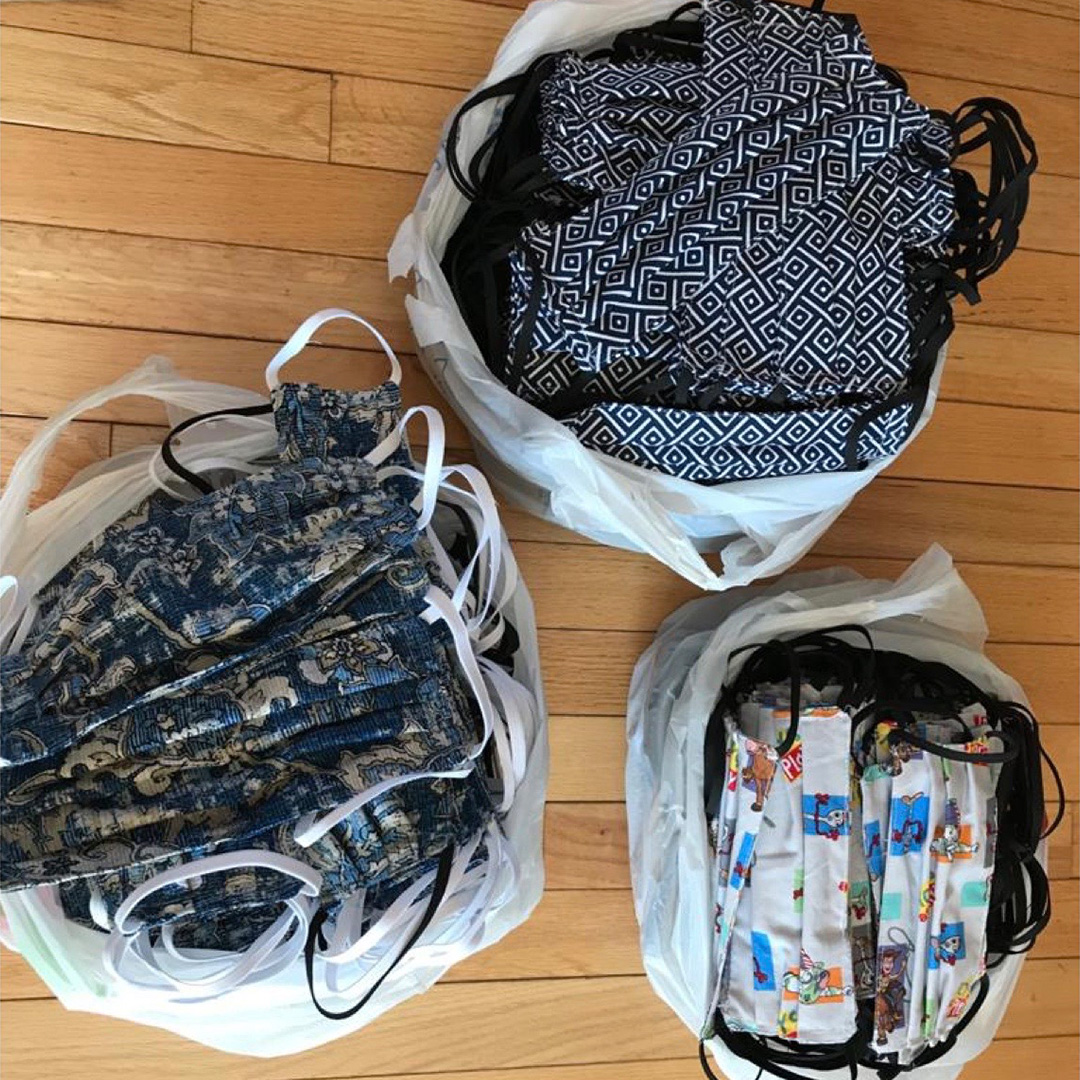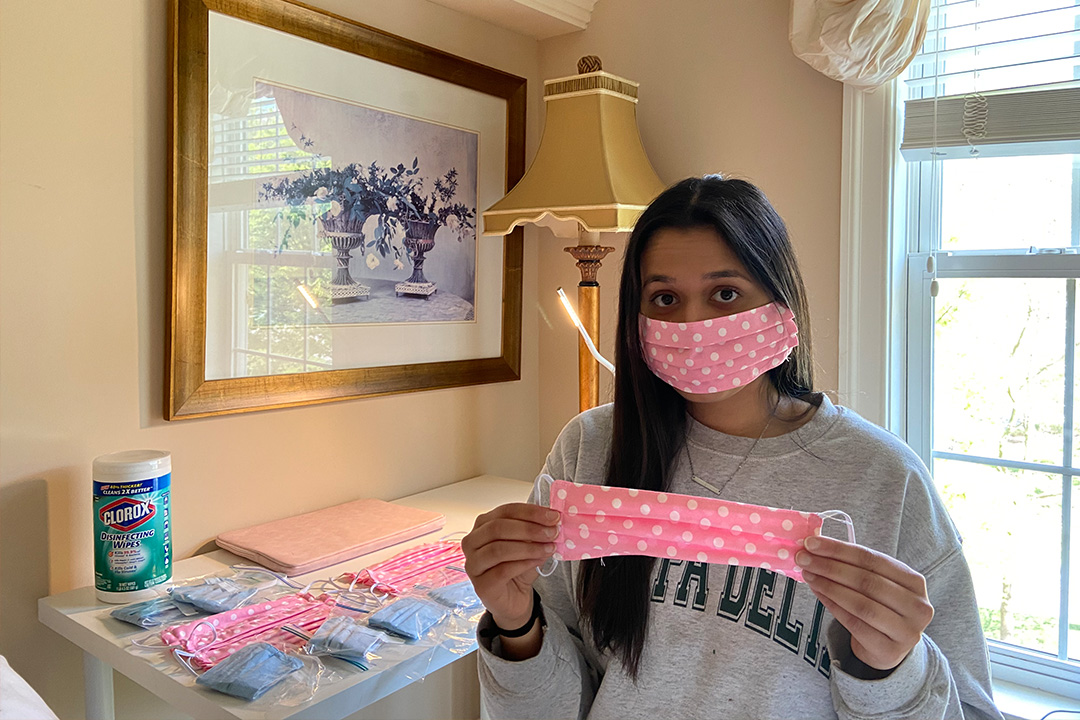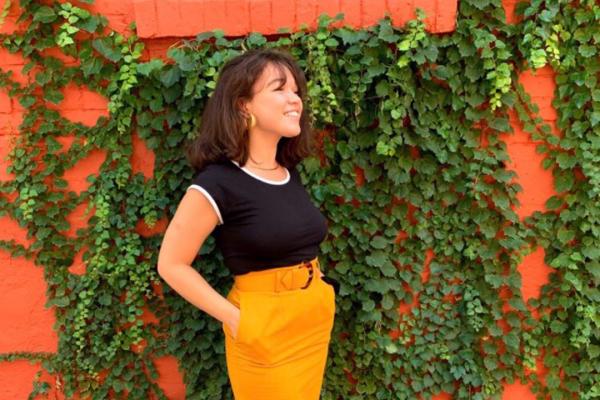Sewing Lesson: Senior Launches Mask-Making Project
Senior Leisha Mahajan can barely sew a stich. But that hasn’t stopped the political science major from organizing a mask-making project for Maryland hospitals struggling with supply shortages during the COVID pandemic. Bringing together friends, family and fellow students, she formed a group called FightCV, which has already made and delivered more than 1,000 masks for health care workers at the Johns Hopkins Hospital in Baltimore and Howard County General Hospital in Columbia, Md.
“Everyone is trying to find a way to do something—anything—to help out,” she said. “Just because we are social distancing, we don’t have to disengage from society. There are definitely ways to come together to make a difference.”
Mahajan is no stranger to charitable causes. She’s volunteered with Brady, a nonprofit dedicated to reducing gun violence, and she regularly participated in GW Dance Marathon, raising funds for the Children’s National Health System. When her internship with the Washington D.C. Public Defenders office ended prematurely due to the COVID crisis, Mahajan was determined to help her community. Concerned about hospital mask shortages, she took up a needle and thread—only to discover that she had no sewing talent.

Mahajan’s FightCV has made and delivered more than 1,000 masks to hospitals.
“It took me so long to make just one mask that I realized maybe this wasn’t the best use of my strengths,” she laughed. Instead, Mahajan coordinated the FightCV mask-making project. While friends and family work their sewing machines, Mahajan handles everything from procuring the material—their daily output of 350 cloth masks requires 30 yards of fabric—to managing deliveries with hospital materials offices. Through her social media accounts, Mahajan is offering a webinar on how to make masks and tips on other ways to help out, like blood donations and food drives.
And now she's teaming with Corcoran students to design thank-you cards that can be digitally delivered to hospital professionals and employees of essential businesses like grocery stores. Most hospitals are not accepting physical cards, but are encouraging people to send digital versions of hand-made cards.
Mahajan stresses that her cloth-and-elastic masks are not medical-grade protection equipment. The FightCV masks are mainly used by nurses, technicians and custodial staff when not in direct contact with coronavirus patients. The hospital staff also disinfect the masks before distributing them. Mahajan notes that each hospitals’ needs are different—some, for example, want single-use masks, others request reusable items. She advises contacting individual hospitals before embarking on your own donation projects.
The FightCV project not only helps her community, but Mahajan said it’s also lifted the spirits of her fellow seniors. “A lot of my senior friends have very upset about losing their final semester,” she said. “But doing something like this gives you a purpose. It’s helped me realize that my senior year might have been cut short, but I can do so much with this time to help all of us get through this.”
Feeding Hope: At Foodbank, Student Serves Her Community
First-year Sophie Gengler volunteers at a community foodbank in her California hometown.
First-year student Sophie Gengler has volunteered at the Neighbors 4 Neighbors foodbank in Palm Desert, Calif., since middle school. For years, she’s distributed fresh fruit, canned goods and frozen fish and chicken to needy families in her community.
But since the start of the COVID crisis, that need has grown beyond anything Gengler has seen before. Like foodbanks around the country, Neighbors 4 Neighbors is struggling with a surge in demand for their services—even as they suffer from a shortage of volunteers and supplies. The program usually serves about 400 families a week. Now, it’s common for more than 1,000 families to seek aid at their church headquarters each day.
“There are more people who need more help than ever before,” said Gengler, a cognitive neuroscience major. “And we’re trying to take care of as many of them as we can.”
Supported by the U.S. Department of Agriculture and donations from local restaurants, Neighbors 4 Neighbors supplies staples of produce, proteins and carbohydrates to the Palm Desert community. Until recently, it also operated a thrift shop in the church basement where people could sort through donated clothing while waiting for the food distribution.
But during the coronavirus pandemic, the foodbank has transformed into a drive-thru operation. Inside the church, volunteers in masks and gloves pack food supplies for families of four. Outside, rows of waiting vehicles stretch from the parking lot into nearby Highway 74. As they pull up to the curb, volunteers like Gengler deposit bags of groceries in their trunks and wave them back on the road as quickly as possible. Since Gengler left Washington, D.C., in March, she’s volunteered at the foodbank each week. The lines of cars keep getting longer, she says, with Maserati’s and BMW’s alongside trucks and mini-vans.
“This is a very desperate time. There are families here that we help often. But I’m also seeing new people who never thought they would go to a foodbank,” she said.
The foodbank itself is still receiving supplies, but not enough to keep up with its skyrocketing demand. Each bag they distribute now contains fewer items. “But nobody leaves empty handed,” Gengler said.
Gengler, who has volunteered for causes from environmental activism to reproductive rights, credits the foodbank with keeping her positive during anxious times. In addition to helping her community, she also feels like she’s making a difference in a global emergency.
“In years to come, we’ll all look back and ask ourselves, ‘What did you do in a time of crisis?’” she said. “I want to be able to say that, when people needed me most, I was doing all that I could to help.”



